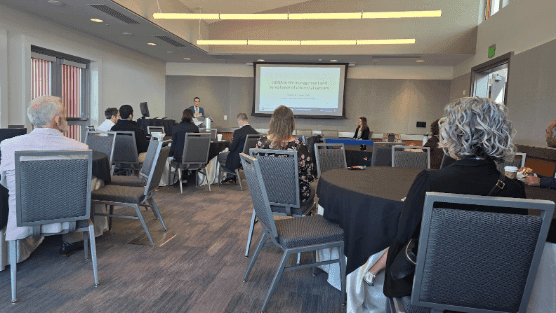Community Partnerships, Therapy Access, and Implementation Science Take Center Stage on Day 1 of SCHD

Author
Binaytara Team
Opening Day at SCHD25: A Community-Driven Approach to Cancer Health Disparities
The Seattle Summit on Cancer Health Disparities (SCHD25) kicked off on April 25 with an auditorium filled with inquisitive and community-oriented physicians, faculty, and other healthcare practitioners ready to have candid conversations and deliberate on realities about the barriers and breakthroughs shaping cancer care across communities. From global partnerships to deeply personal patient stories, Friday’s sessions made one thing clear: fixing cancer disparities takes more than one individual with good intentions; it takes a community resolute to make a change.
Session 1: Evolving the Landscape Toward Cancer Health Equity
Following the welcome remarks by Dr. Binay Shah, the co-founder and president of Binaytara, Session 1, entitled “Evolving the Landscape Towards Cancer Health Equity” began. Presentations in Session 1 opened with a deep dive into community-based participatory research, reminding us that if we want to engage communities, we need to start by listening. One example featured multilingual vaccine education efforts, faith-based outreach, and social media influencer engagement, resulting in a remarkably diverse enrollment (47% BIPOC) in a COVE Moderna study. The talk also called out systemic barriers, like the halting of DEI programs at major institutions, while urging researchers to keep showing up for their communities.
Another speaker followed with sobering data from a large-scale national health study, highlighting how discrimination is not only a social problem but a health crisis. For example, studies presented showed that cancer survivors who experienced microaggressions or dismissive care reported poorer mental and physical health outcomes. But when the discrimination data was controlled for, racial disparities narrowed, reinforcing structural racism as a root driver. The call to action? Train entire health systems, not just individual providers, to lead with empathy.
Panel Discussion: Funding Gaps, DEI Challenges, and the Role of Philanthropy
Then, a powerhouse panel addressed the hard truths: terminated grants, silenced DEI efforts, and the emotional toll of staying in the fight for equity. The tone of the panel was weary, but the determination to continue moving forward was palpable. Speakers emphasized the need for philanthropy and other non-governmental organizations to help fill funding gaps and called for trust-building and accountability without putting the burden solely on community partners.
Keynote Focus: Structural Solutions to Cancer Health Disparities
The keynote that followed zeroed in on the intersectional root causes of disparities—from rural access gaps to Medicaid expansion—arguing for upstream interventions and structural solutions.
The subsequent panel touched on many aspects of cancer care: practical frustrations like prior authorizations, and deeply human concerns like fear and stigma. One physician shared how misinformation, isolation, and financial barriers shape cancer journeys in rural communities. Another community provider stressed the unhelpful impact that insurance has on the physician–patient relationship, noting that it drains valuable time needed to actually listen and build trust with patients.
Breakout Sessions: Smoking-Related Disparities, ctDNA in GI Oncology, and Cellular Therapy Access
Several breakout sessions that followed kept the momentum going, featuring the topics of “Smoking-Related Cancer Disparities,” “ctDNA in Current and Future Practice of GI Oncology,” and “Access to Cellular Therapy.” As attendees discussed the use of cell-free DNA (cfDNA) and circulating tumor DNA (ctDNA) in the management and surveillance of colorectal cancer in one room, others unpacked the complexities of CAR-T treatment in another. Notably, in the “Access to Cellular Therapy” session, speakers dissected the hidden costs that limit patient access. One presenter shared findings from a recent study on financial hardship in blood cancer patients, noting that the real barrier to treatment effectiveness is often not biology, but access. Other physicians stressed that housing, caregiver availability, and lack of academic–community collaboration are major issues. The session wrapped up by emphasizing the need for community-based care to address disparities and improve access.

Breakout session on ‘Access to Cellular Therapy’
Global Implementation Science: Lessons from HPV Screening Initiatives
The afternoon turned global with real-world implementation science from Africa, showcasing HPV self-sampling kits and mobile screening clinics as examples of context-aware care delivery. The panel discussion that followed urged similar strategies to be applied here in the U.S., particularly in rural and under-resourced areas.
Innovating Clinical Research: The Pragmatica-Lung Trial and Financial Toxicity Screening
The next presentation showcased the Pragmatica-Lung trial. What makes this trial different is its pragmatic design: minimal eligibility criteria, no required lab tests or imaging, and dramatically reduced data collection—all aimed at lowering barriers for both patients and research sites. Also highlighted was a new tool to screen for financial toxicity, which can be used to guide referrals for further assessments and future interventions. The audience questions that followed highlighted the importance of measuring what matters. Other discussions that ensued touched on bold solutions, including universal healthcare, and the value of patient and community advisory councils.
Speakers also addressed clinical trial diversity, emphasizing the need for trust, communication, and culturally responsive engagement. A session on precision medicine unpacked the complexity of testing and stressed the importance of provider education, policy support, and accessible tools. The day closed with a case study from South Carolina, where a community-driven lung cancer study revealed the challenges and necessity of inclusive research.
Closing Reflections: Advancing Cancer Equity through Community, Policy, and Education
Taken together, Day 1 at SCHD25 highlighted disparities in cancer care with an unflinching call to action. Systemic failures were included in the discussion as well. Both academics and community oncologists shared tested strategies, spotlighted the lived experiences behind the data, and pointed to ongoing research for insight and direction. As the doors closed after the last panel discussion, the conference halls pulsated with an important reminder: the road to achieving impactful health equity is a long one paved with strong community partnerships, policy shifts, and ongoing patient education. The calls to action at all sessions were laced with a sense of urgency, and as one speaker put it best: “There’s no time to wait. Get involved.”